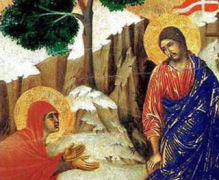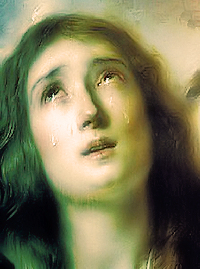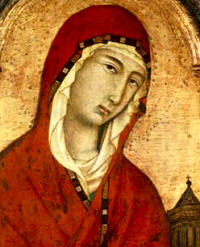» Enjoy our Liturgical Seasons series of e-books!
On June 10, 2016, the liturgical celebration honoring St. Mary Magdalene was raised from a memorial to a feast, putting her on par with the Apostles.
"On the one hand, she has the honour of being the 'prima testis' to the resurrection of the Lord, the first to see the empty tomb and the first to hear the truth of His resurrection. Christ has a special consideration and mercy for this woman, who shows her love for Him, looking for Him in the garden with anguish and suffering, with 'lacrimas humilitatis', as St. Anselm says in the aforementioned prayer. In this sense, I would like to show the difference between the two women present in the garden of Paradise, and in the garden of the Resurrection. The first disseminates death where there was life, and the second proclaims Life from a tomb, the place of death. … Likewise, it is in the garden of resurrection that the Lord says to Mary Magdalene, 'Noli me tangere'. It is an invitation not only to Mary, but also to all the Church, to enter into an experience of faith that overcomes any materialistic appropriation or human understanding of the divine mystery. It has ecclesial importance! It is a good lesson for every disciple of Jesus: do not seek human securities and worldly honours, but faith in the Living and Risen Christ."
"Precisely since she was an eyewitness to the Risen Christ, she was also the first to testify before the apostles. She fulfils the mandate the Risen Christ gives her: 'go to my brothers and say to them … Mary Magdalene went and announced to the disciples, “I have seen the Lord”—and that he had said these things to her'. In this way she becomes, as is already known, an evangelist, or rather a messenger who announces the good news of the resurrection of the Lord; or, as Rabano Mauro and St. Thomas Aquinas said, 'apostolorum apostola', as she announces to the apostles what they in turn will announce to all the world. The Angelic Doctor is right to apply this term to Mary Magdalene: she is the witness to the Risen Christ and announces the message of the resurrection of the Lord, like the other apostles. Therefore it is right that the liturgical celebration of this woman should have the same level of festivity given to the apostles in the General Roman Calendar, and that the special mission of this woman be highlighted, as an example and model to every woman in the Church." — Archbishop Roche.
St. Mary Magdalene
 The feast of St. Mary Magdalene is considered one of the most mystical of feasts, and it is said that of all the songs of the saints, that of Mary Magdalene is the sweetest and strongest because her love was so great. That love was praised by Jesus Himself who said that because much was forgiven her, she loved much. Where she is buried, no one knows. Legend has her dying in Provence, France, in a cavern where she spent her last days, and her body resting in the chapel of St. Maximin in the Maritime Alps. Another has her buried in Ephesus where she went with St. John after the Resurrection. This latter view is more likely, and St. Willibald, the English pilgrim to the Holy Land in the eighth century, was shown her tomb there.
The feast of St. Mary Magdalene is considered one of the most mystical of feasts, and it is said that of all the songs of the saints, that of Mary Magdalene is the sweetest and strongest because her love was so great. That love was praised by Jesus Himself who said that because much was forgiven her, she loved much. Where she is buried, no one knows. Legend has her dying in Provence, France, in a cavern where she spent her last days, and her body resting in the chapel of St. Maximin in the Maritime Alps. Another has her buried in Ephesus where she went with St. John after the Resurrection. This latter view is more likely, and St. Willibald, the English pilgrim to the Holy Land in the eighth century, was shown her tomb there.
She was the first recorded witness to the resurrection of Jesus, His most ardent and loving follower. She had stood with Mary at the foot of the Cross on that brutal Good Friday afternoon and had been by the side of Mary during these difficult hours. On Easter morning, she went with the other women to the tomb and it was there, in the garden near the tomb, that Jesus appeared to her. It was she who brought the news of the Resurrection to the Apostles, and Peter and John raced to the tomb to see what had happened.
 She was from Magadala, a small fishing town on the Sea of Galilee, between Capernaum and Tiberias. She was known to be a "great sinner," a woman of the streets who heard Jesus speak of the mercy and forgiveness of God and changed her life completely. Her matter-of-fact witness to the Resurrection moved Peter and John to go and see for themselves: "I have seen the Lord and these things he said to me." Jesus had chosen her to bring the news to them and she simply told them what had happened.
She was from Magadala, a small fishing town on the Sea of Galilee, between Capernaum and Tiberias. She was known to be a "great sinner," a woman of the streets who heard Jesus speak of the mercy and forgiveness of God and changed her life completely. Her matter-of-fact witness to the Resurrection moved Peter and John to go and see for themselves: "I have seen the Lord and these things he said to me." Jesus had chosen her to bring the news to them and she simply told them what had happened.
She has always been the example of great love and great forgiveness, one of those close to Jesus who grasped the truth of God's love for human beings and spent her life bearing witness to that love.
—Excerpted from The One Year Book of Saints by Rev. Clifford Stevens
Patronage: against sexual temptation; apothecaries; contemplative life; contemplatives; converts; druggists; glove makers; hairdressers; hairstylists; penitent sinners; penitent women; people ridiculed for their piety; perfumeries; perfumers; pharmacists; reformed prostitutes; tanners; women. See CatholicSaints.info for a whole list of locations.
Symbols and Representation: long hair; Rich raiment; alabaster box of ointment; skull; book; vase of sweet spices; crucifix; open book; boat.
Highlights and Things to Do:
- From the Catholic Culture library:
- Listen to the Catholic Culture Audiobook St. Robert Southwell—Mary Magdalene’s Complaint at Christ’s Death read by James Majewski.
- Read Jennifer Gregory Miller's posts on St. Mary Magdalen's feast:
- Read more about St. Mary Magdalen:
- Tradition has it that St. Mary Magdalene spent the last 30 years of her life in France. Read Saints in Rome for the location of her relics.
- Read the book Witnesses to Calvary: Reflections on the Seven Last Words of Jesus by Fr. Richard C. Antall is an interesting and thoughtful look at St. Mary Magdalene's place at the foot of the cross. He contrasts her deliverance from seven demons with the symmetry of the Seven Words.







